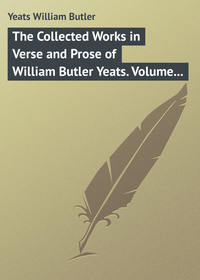 полная версия
полная версияJohn Sherman and Dhoya
A few days later Sherman was hurrying through the town of Ballah. It was Saturday, and he passed down through the marketing country people, and the old women with baskets of cakes and gooseberries and long pieces of sugarstick shaped like walking-sticks, and called by children “Peggie’s leg.”
Now, as two months earlier he was occasionally recognized and greeted, and, as before, went on without knowing, his eyes full of unintelligent sadness because the mind was making merry afar. They had the look we see in the eyes of animals and dreamers. Everything had grown simple, his problem had taken itself away. He was thinking what he would say to Mary Carton. Now they would be married, they would live in a small house with a green door and new thatch, and a row of beehives under a hedge. He knew where just such a house stood empty. The day before he and his mother had discussed, with their host of the Imperial Hotel, this question of houses. They knew the peculiarities of every house in the neighbourhood, except two or three built while they were away. All day Sherman and his mother had gone over the merits of the few they were told were empty. She wondered why her son had grown so unpractical. Once he was so easily pleased – the row of beehives and the new thatch did not for her settle the question. She set it all down to Miss Leland and the plays, and the singing, and the belladonna, and remembered with pleasure how many miles of uneasy water lay between the town of Ballah and these things.
She did not know what else beside the row of beehives and the new thatch her son’s mind ran on as he walked among the marketing country people, and the gooseberry sellers, and the merchants of “Peggie’s leg,” and the boys playing marbles in odd corners, and the men in waistcoats with flannel sleeves driving carts, and the women driving donkeys with creels of turf or churns of milk. Just now she was trying to remember whether she used to buy her wool for knitting at Miss Peters’s or from Mrs. Macallough’s at the bridge. One or other sold it a halfpenny a skein cheaper. She never knew what went on inside her son’s mind, she had always her own fish to fry. Blessed are the unsympathetic. They preserve their characters in an iron safe while the most of us poor mortals are going about the planet vainly searching for any kind of a shell to contain us, and evaporating the while.
Sherman began to mount the hill to the vicarage. He was happy. Because he was happy he began to run. Soon the steepness of the hill made him walk. He thought about his love for Mary Carton. Seen by the light of this love everything that had happened to him was plain now. He had found his centre of unity. His childhood had prepared him for this love. He had been solitary, fond of favourite corners of fields, fond of going about alone, unhuman like the birds and the leaves, his heart empty. How clearly he remembered his first meeting with Mary. They were both children. At a school treat they watched the fire balloon ascend, and followed it a little way over the fields together. What friends they became, growing up together, reading the same books, thinking the same thoughts.
As he came to the door and pulled at the great hanging iron bell handle, the fire balloon reascended in his heart, surrounded with cheers and laughter.
IIIHe kept the servant talking for a moment or two before she went for Miss Carton. The old rector, she told him, was getting less and less able to do much work. Old age had come almost suddenly upon him. He seldom moved from the fireside. He was getting more and more absent-minded. Once lately he had brought his umbrella into the reading-desk. More and more did he leave all things to his children – to Mary Carton and her younger sisters.
When the servant had gone Sherman looked round the somewhat gloomy room. In the window hung a canary in a painted cage. Outside was a narrow piece of shaded ground between the window and the rectory wall. The laurel and holly bushes darkened the window a good deal. On a table in the centre of the room were evangelistic books with gilded covers. Round the mirror over the mantlepiece were stuck various parish announcements, thrust between the glass and the gilding. On a small side table was a copper ear-trumpet.
How familiar everything seemed to Sherman. Only the room seemed smaller than it did three years before, and close to the table with the ear-trumpet, at one side of the fireplace before the arm-chair, was a new threadbare patch in the carpet.
Sherman recalled how in this room he and Mary Carton had sat in winter by the fire, building castles in the air for each other. So deeply meditating was he that she came in and stood unnoticed beside him.
“John,” she said at last, “it is a great pleasure to see you so soon again. Are you doing well in London?”
“I have left London.”
“Are you married, then? You must introduce me to your wife.”
“I shall never be married to Miss Leland.”
“What?”
“She has preferred another – my friend William Howard. I have come here to tell you something, Mary.” He went and stood close to her and took her hand tenderly. “I have always been very fond of you. Often in London, when I was trying to think of another kind of life, I used to see this fireside and you sitting beside it, where we used to sit and talk about the future. Mary – Mary,” he held her hand in both his – “you will be my wife?”
“You do not love me, John,” she answered, drawing herself away. “You have come to me because you think it your duty. I have had nothing but duty all my life.”
“Listen,” he said. “I was very miserable; I invited Howard to stay with us. One morning I found a note on the smoking-room table to say that Margaret had accepted him, and I have come here to ask you to marry me. I never cared for any one else.”
He found himself speaking hurriedly, as though anxious to get the words said and done with. It now seemed to him that he had done ill in this matter of Miss Leland. He had not before thought of it – his mind had always been busy with other things. Mary Carton looked at him wonderingly.
“John,” she said at last, “did you ask Mr. Howard to stay with you on purpose to get him to fall in love with Miss Leland, or to give you an excuse for breaking off your engagement, as you knew he flirted with every one?”
“Margaret seems very fond of him. I think they are made for each other,” he answered.
“Did you ask him to London on purpose?”
“Well, I will tell you,” he faltered. “I was very miserable. I had drifted into this engagement I don’t know how. Margaret glitters and glitters and glitters, but she is not of my kind. I suppose I thought, like a fool, I should marry some one who was rich. I found out soon that I loved nobody but you. I got to be always thinking of you and of this town. Then I heard that Howard had lost his curacy, and asked him up. I just left them alone and did not go near Margaret much. I knew they were made for each other. Do not let us talk of them,” he continued, eagerly. “Let us talk about the future. I will take a farm and turn farmer. I dare say my uncle will not give me anything when he dies because I have left his office. He will call me a ne’er-do-weel, and say I would squander it. But you and I – we will get married, will we not? We will be very happy,” he went on, pleadingly. “You will still have your charities, and I shall be busy with my farm. We will surround ourselves with a wall. The world will be on the outside, and on the inside we and our peaceful lives.”
“Wait,” she said; “I will give you your answer,” and going into the next room returned with several bundles of letters. She laid them on the table; some were white and new, some slightly yellow with time.
“John,” she said, growing very pale, “here are all the letters you ever wrote me from your earliest boyhood.” She took one of the large candles from the mantlepiece, and, lighting it, placed it on the hearth. Sherman wondered what she was going to do with it. “I will tell you,” she went on, “what I had thought to carry to the grave unspoken. I have loved you for a long time. When you came and told me you were going to be married to another I forgave you, for man’s love is like the wind, and I prayed that God might bless you both.” She leant down over the candle, her face pale and contorted with emotion. “All these letters after that grew very sacred. Since we were never to be married they grew a portion of my life, separated from everything and every one – a something apart and holy. I re-read them all, and arranged them in little bundles according to their dates, and tied them with thread. Now I and you – we have nothing to do with each other any more.”
She held the bundle of letters in the flame. He got up from his seat. She motioned him away imperiously. He looked at the flame in a bewildered way. The letters fell in little burning fragments about the hearth. It was all like a terrible dream. He watched those steady fingers hold letter after letter in the candle flame, and watched the candle burning on like a passion in the grey daylight of universal existence. A draught from under the door began blowing the ash about the room. The voice said —
“You tried to marry a rich girl. You did not love her, but knew she was rich. You tired of her as you tire of so many things, and behaved to her most wrongly, most wickedly and treacherously. When you were jilted you came again to me and to the idleness of this little town. We had all hoped great things of you. You seemed good and honest.”
“I loved you all along,” he cried. “If you would marry me we would be very happy. I loved you all along,” he repeated – this helplessly, several times over. The bird shook a shower of seed on his shoulder. He picked one of them from the collar of his coat and turned it over in his fingers mechanically. “I loved you all along.”
“You have done no duty that came to you. You have tired of everything you should cling to; and now you have come to this little town because here is idleness and irresponsibility.”
The last letter lay in ashes on the hearth. She blew out the candle, and replaced it among the photographs on the mantlepiece, and stood there as calm as a portion of the marble.
“John, our friendship is over – it has been burnt in the candle.”
He started forward, his mind full of appeals half-stifled with despair, on his lips gathered incoherent words: “She will be happy with Howard. They were made for each other. I slipped into it. I always thought I should marry some one who was rich. I never loved any one but you. I did not know I loved you at first. I thought about you always. You are the root of my life.”
Steps were heard outside the door at the end of a passage. Mary Carton went to the door and called. The steps turned and came nearer. With a great effort Sherman controlled himself. The door opened, and a tall, slight girl of twelve came into the room. A strong smell of garden mould rose from a basket in her hands. Sherman recognized the child who had given him tea that evening in the schoolhouse three years before.
“Have you finished weeding the carrots?” said Mary Carton.
“Yes, Miss.”
“Then you are to weed the small bed under the pear-tree by the tool-house. Do not go yet, child. This is Mr. Sherman. Sit down a little.”
The child sat down on the corner of a chair with a scared look in her eyes. Suddenly she said —
“Oh, what a lot of burnt paper!”
“Yes; I have been burning some old letters.”
“I think,” said John, “I will go now.” Without a word of farewell he went out, almost groping his way.
He had lost the best of all the things he held dear. Twice he had gone through the fire. The first time worldly ambition left him, on the second love. An hour before the air had been full of singing and peace that was resonant like joy. Now he saw standing before his Eden the angel with the flaming sword. All the hope he had ever gathered about him had taken itself off, and the naked soul shivered.
IVThe road under his feet felt gritty and barren. He hurried away from the town. It was late afternoon. Trees cast bands of shadow across the road. He walked rapidly as if pursued. About a mile to the south of the town he came on a large wood bordering the road and surrounding a deserted house. Some local rich man once lived there, now it was given over to a caretaker who lived in two rooms in the back part. Men were at work cutting down trees in two or three parts of the wood. Many places were quite bare. A mass of ruins – a covered well, and the wreckage of castle wall – that that had been roofed with green for centuries lifted themselves up, bare as anatomies. The sight intensified, by some strange sympathy, his sorrow, and he hurried away as from a thing accursed of God.
The road led to the foot of a mountain, topped by a cairn supposed in popular belief to be the grave of Maeve, Mab of the fairies, and considered by antiquarians to mark the place where certain prisoners were executed in legendary times as sacrifices to the moon.
He began to climb the mountain. The sun was on the rim of the sea. It stayed there without moving, for as he ascended he saw an ever-widening circle of water.
He threw himself down upon the cairn. The sun sank under the sea. The Donegal headlands mixed with the surrounding blue. The stars grew out of heaven.
Sometimes he got up and walked to and fro. Hours passed. The stars, the streams down in the valley, the wind moving among the boulders, the various unknown creatures rustling in the silence – all these were contained within themselves, fulfilling their law, content to be alone, content to be with others, having the peace of God or the peace of the birds of prey. He only did not fulfil his law; something that was not he, that was not nature, that was not God, had made him and her he loved its tools. Hope, memory, tradition, conformity, had been laying waste their lives. As he thought this the night seemed to crush him with its purple foot. Hour followed hour. At midnight he started up, hearing a faint murmur of clocks striking the hour in the distant town. His face and hands were wet with tears, his clothes saturated with dew.
He turned homeward, hurriedly flying from the terrible firmament. What had this glimmering and silence to do with him – this luxurious present? He belonged to the past and the future. With pace somewhat slackened, because of the furze, he came down into the valley. Along the northern horizon moved a perpetual dawn, travelling eastward as the night advanced. Once, as he passed a marsh near a lime-kiln, a number of small birds rose chirruping from where they had been clinging among the reeds. Once, standing still for a moment where two roads crossed on a hill-side, he looked out over the dark fields. A white stone rose in the middle of a field, a score of yards in front of him. He knew the place well; it was an ancient burying-ground. He looked at the stone, and suddenly filled by that terror of the darkness children feel, began again his hurried walk.
He re-entered Ballah by the southern side. In passing he looked at the rectory. To his surprise a light burned in the drawing-room. He stood still. The dawn was brightening towards the east, but all round him was darkness, seeming the more intense to his eyes for their being fresh from the unshaded fields. In the midst of this darkness shone the lighted window. He went over to the gate and looked in. The room was empty. He was about to turn away when he noticed a white figure standing close to the gate. The latch creaked and the gate moved slowly on its hinges.
“John,” said a trembling voice, “I have been praying, and a light has come to me. I wished you to be ambitious – to go away and do something in the world. You did badly, and my poor pride was wounded. You do not know how much I had hoped from you; but it was all pride – all pride and foolishness. You love me. I ask no more. We need each other; the rest is with God.”
She took his hand in hers, and began caressing it. “We have been shipwrecked. Our goods have been cast into the sea.” Something in her voice told of the emotion that divides the love of woman from the love of man. She looked upon him whom she loved as full of a helplessness that needed protection, a reverberation of the feeling of the mother for the child at the breast.
DHOYA
ILong ago, before the earliest stone of the pyramids was laid, before the Bo tree of Buddha unrolled its first leaf, before a Japanese had painted on a temple wall the horse that every evening descended and trampled the rice-fields, before the ravens of Thor had eaten their first worm together, there lived a man of giant stature and of giant strength named Dhoya. One evening Fomorian galleys had entered the Bay of the Red Cataract, now the Bay of Ballah, and there deserted him. Though he rushed into the water and hurled great stones after them they were out of reach. From earliest childhood the Fomorians had held him captive and compelled him to toil at the oar, but when his strength had come his fits of passion made him a terror to all on board. Sometimes he would tear the seats of the galley from their places, at others drive the rowers to some corner where, trembling, they would watch him pacing to and fro till the passion left him. “The demons,” they said, “have made him their own.” So they enticed him on shore, he having on his head a mighty stone pitcher to fill with water, and deserted him.
When the last sail had dropped over the rim of the world he rose from where he had flung himself down on the sands and paced through the forests eastward. After a time he reached that lake among the mountains where in later times Dermot drove down four stakes and made thereon a platform with four flags in the centre for a hearth, and placed over all a roof of wicker and skins, and hid his Grania, islanded thereon. Still eastward he went, what is now Bulban on one side, Cope’s mountain on the other, until at last he threw himself at full length in a deep cavern and slept. Henceforward he made this cavern his lair, issuing forth to hunt the deer or the bears or the mountain oxen. Slowly the years went by, his fits of fury growing more and more frequent, though there was no one but his own shadow to rave against. When his fury was on him even the bats and owls, and the brown toads that crept out of the grass at twilight would hide themselves – even the bats and owls and the brown toads. These he had made his friends, and let them crawl and perch about him, for at times he would be very gentle, and they too were sullen and silent – the outcasts from they knew not what. But most of all, things placid and beautiful feared him. He would watch for hours, hidden in the leaves, to reach his hand out slowly and carefully at last, and seize and crush some glittering halcyon.
Slowly the years went by and human face he never saw, but sometimes, when the gentle mood was on him and it was twilight, a presence seemed to float invisibly by him and sigh softly, and once or twice he awoke from sleep with the sensation of a finger having rested for a moment on his forehead, and would mutter a prayer to the moon before turning to sleep again – the moon that glimmered through the door of his cave. “O moon,” he would say, “that wandereth in the blue cave, more white than the beard of Partholan, whose years were five hundred, sullen and solitary, sleeping only on the floor of the sea: keep me from the evil spirits of the islands of the lake southward beyond the mountains, and the evil spirits of the caves northward beyond the mountains, and the evil spirits who wave their torches by the mouth of the river eastward beyond the valley, and the evil spirits of the pools westward beyond the mountains, and I will offer you a bear and a deer in full horn, O solitary of the cave divine, and if any have done you wrong I will avenge you.”
Gradually, however, he began to long for this mysterious touch.
At times he would make journeys into distant parts, and once the mountain oxen gathered together, proud of their overwhelming numbers and their white horns, and followed him with great bellowing westward, he being laden with their tallest, well-nigh to his cave, and would have gored him, but, pacing into a pool of the sea to his shoulders, he saw them thunder away, losing him in the darkness. The place where he stood is called Pooldhoya to this day.
So the years went slowly by, and ever deeper and deeper came his moodiness, and more often his fits of wrath. Once in his gloom he paced the forests for miles, now this way now that, until, returning in the twilight, he found himself standing on a cliff southward of the lake that was southward of the mountains. The moon was rising. The sound of the swaying of reeds floated from beneath, and the twittering of the flocks of reed-wrens who love to cling on the moving stems. It was the hour of votaries. He turned to the moon, then hurriedly gathered a pile of leaves and branches, and making a fire cast thereon wild strawberries and the fruit of the quicken tree. As the smoke floated upwards a bar of faint purple clouds drifted over the moon’s face – a refusal of the sacrifice. Hurrying through the surrounding woods he found an owl sleeping in the hollow of a tree, and returning cast him on the fire. Still the clouds gathered. Again he searched the woods. This time a badger was uselessly cast among the flames. Time after time he came and went, sometimes returning immediately with some live thing, at others not till the fire had almost burnt itself out. Deer, wild swine, birds, all to no purpose. Higher and higher he piled the burning branches, the flames and the smoke waved and circled like the lash of a giant’s whip. Gradually the nearer islands passed the rosy colour on to their more distant brethren. The reed-wrens of the furthest reed beds disturbed amid their sleep must have wondered at the red gleam reflected in each other’s eyes. Useless his night-long toil; the clouds covered the moon’s face more and more, until, when the long fire lash was at its brightest, they drowned her completely in a surge of unbroken mist. Raging against the fire he scattered with his staff the burning branches, and trampled in his fury the sacrificial embers beneath his feet. Suddenly a voice in the surrounding darkness called him softly by name. He turned. For years no articulate voice had sounded in his ears. It seemed to rise from the air just beneath the verge of the precipice. Holding by a hazel bush he leaned out, and for a moment it seemed to him the form of a beautiful woman floated faintly before him, but changed as he watched to a little cloud of vapour; and from the nearest of the haunted islands there came assuredly a whiff of music. Then behind him in the forest said the voice, “Dhoya, my beloved.” He rushed in pursuit; something white was moving before him. He stretched out his hand; it was only a mass of white campion trembling in the morning breeze, for an ashen morning was just touching the mists on the eastern mountains. Beginning suddenly to tremble with supernatural fear Dhoya paced homewards. Everything was changed; dark shadows seemed to come and go, and elfin chatter to pass upon the breeze. But when he reached the shelter of the pine woods all was still as of old. He slackened his speed. Those solemn pine-trees soothed him with their vast unsociability – many and yet each one alone. Once or twice, when in some glade further than usual from its kind arose some pine-tree larger than the rest, he paused with bowed head to mutter an uncouth prayer to that dark outlaw. But when issuing once more, as he neared his cave, into the region of mountain ash and hazel the voices seemed again to come and go, and the shadows to circle round him, and once a voice said, he imagined, in accents faint and soft as falling dew, “Dhoya, my beloved.” But a few yards from the cave all grew suddenly silent.
IISlower and slower he went, with his eyes on the ground, bewildered by all that was happening. A few feet from the cave he stood still, counting aimlessly the round spots of light made by the beams slanting through trees that hid with their greenness, as in the centre of the sea, that hollow rock. As over and over he counted them, he heard, first with the ear only, then with the mind also, a footstep going to and fro within the cave. Lifting his eyes he saw the same figure seen on the cliff – the figure of a woman, beautiful and young. Her dress was white, save for a border of feathers dyed the fatal red of the spirits. She had arranged in one corner the spears, and in the other the brushwood and branches used for the fire, and spread upon the ground the skins, and now began pulling vainly at the great stone pitcher of the Fomorians.









